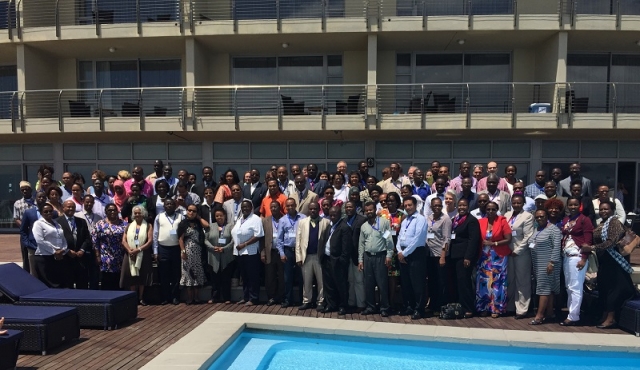Delegates adopted recommendations on Exchange of Best Practices to Reaching Every District/Community, equity and integration of child survival interventions in ESA
 Cape Town, 29 January 2016 - The first ever workshop on Exchange of Best Practices to Reaching Every District/Community (RED/REC), equity and integration of child survival interventions in East and Southern African (ESA) jointly organized by WHO, UNICEF and JSI, MCSP/USAID, ended with delegates agreeing on recommendations to address inequities in coverage of child survival interventions and make progress towards achieving Universal Health Coverage.
Cape Town, 29 January 2016 - The first ever workshop on Exchange of Best Practices to Reaching Every District/Community (RED/REC), equity and integration of child survival interventions in East and Southern African (ESA) jointly organized by WHO, UNICEF and JSI, MCSP/USAID, ended with delegates agreeing on recommendations to address inequities in coverage of child survival interventions and make progress towards achieving Universal Health Coverage.
One hundred forty six (146) delegates drawn from the Ministries of Health child health and immunization programmes, partner organizations namely, WHO, UNICEF, JSI/MCSP, CDC, Bill and Melinda Gates Foundation, Sabin Vaccine Institute, the Gavi Alliance and PATH agreed for WHO and partners to develop a framework for integration of child survival interventions to address inequities and make progress towards achieving Universal Health Coverage. Additionally EPI managers were called upon to use findings and recommendations from the workshop to brief their respective ministers in preparation for the impending Ministerial Conference on Immunization in Africa scheduled to take place from February 24-25 in Addis Ababa, Ethiopia.
By the end of the workshop all the ESA countries represented had reviewed the best practices shared and identified key lessons / best practices for adaptation into their own national draft integrated RED/REC strategic approach guide to improve the coverage of immunization and other child survival interventions. In support to the countries’ efforts, WHO and partners pledged to adapt the current RED strategic guidelines to reach the unreached and underserved communities equitably and foster integration along the life course and across the health systems to maximize efficiency and impact on overall child survival..
Speaking at the closing session, the World Health Organization Representative for Zimbabwe, who is also the acting Inter-country Support Team Coordinator for East and Southern African countries, Dr David Okello, said that the progress towards Universal Health Coverage requires concerted efforts by all immunization and child survival stakeholders. He called up on countries and partners to double their efforts through a well-coordinated programmatic and multi sectoral actions at all levels to reach the unreached and underserved children with immunization and other child survival interventions.
The RED approach encourages countries and partners to conduct a thorough micro-planning of immunization and child health services at health facility level, places special emphasis on gap identification and tailoring strategies to address them. It is instrumental in planning and budgeting, implementation and monitoring of quality of services to those missed, unreached and underserved populations, focusing on and working with strong involvement of communities.
The five day workshop whose aim was to share best practices in the sub-region on immunization and child survival interventions focused on the following categories: RED/REC to achieve equity, quality micro-planning, involvement of communities, monitoring for action, resource mobilization for the RED/REC approach and integration of Child Survival Interventions. Of course, countries are at different stages of implementing the RED/REC approach. The workshop provided opportunities for countries to learn from each other on what seems to work best. Partners also provided inputs on practical ways of implementing RED/REC, which were used to reinforce operational frameworks at country level.
Among the key observations made, the delegates agreed that better engaged communities result in bridging the social distance between services and communities to address inequities in immunization and child survival interventions. They decided to work towards involving communities in all aspects of planning, implementation and monitoring of services and to establish environments that empowers and includes communities.
The meeting agreed on the following recommendations:
- Countries to further review the best practices identified, adapt and plan for use in the national context, and develop an operation framework based on the integrated RED/REC strategic approach
- The African Region and partners to adapt the current RED strategic approach guidelines to include the expansion of RED components with equity and integration
- EPI managers to brief their respective ministers on the need to capitalize on the gains and expand RED approach to address inequities before the ministerial meeting
- WHO and partners should develop a regional framework for equitable and integrated delivery of child survival interventions in order to address inequities and make progress towards achieving Universal Health Coverage.
Overall, the workshop has achieved its set objectives which were in line with the WHO transformation agenda specifically that calls for effective communications and partnerships to meet the needs and expectations of its member states and stakeholders. This was realized through the joint and coordinated efforts of all stakeholders with a strong WHO leadership from the preparations to the successful conduct of this historical event.
Beyond the technical discussion on identifying the best ways to operationalize the RED/REC approach in countries, which in our view were achieved beyond our expectations, this ground-breaking workshop also consolidated partnership and networking of concerned parties. WHO leadership in bringing together concerned partners and participants from different countries was highly applauded. Furthermore, it was emphasised that the central role of Health Systems be taken on board when elaborating efforts to integrate child survival interventions.
________________________________________________
For more information, please contact:
Dr Fussum Daniel, Email: danielf [at] who.int
Dr. Teshome Desta, Email: destawolde [at] who.int
Dr Folake Olayinka, Email: folake_olayinka [at] jsi.com
Dr Nasir Yusuf, email: nayusuf [at] unicef.org


